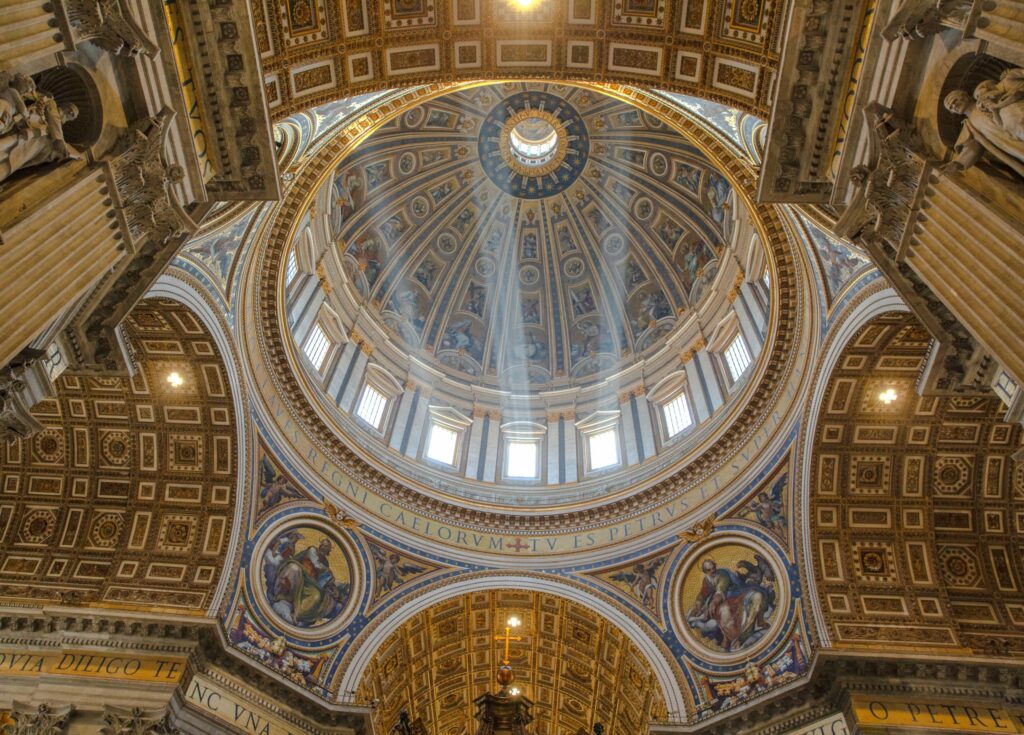How destructive is the sin of greed? Greed is an attitude that craves more and more and can never find enough. Colossians 3:5 equates greed with idolatry, so that should put to rest the debate whether Christians today can be tempted by idols. People are infinitely more important than things, yet, in the pursuit of ever-more wealth and possessions, people have been roughed up and steamrolled over. Even churches sometimes value money and property over God and people. Such is the story of how the Protestant Reformation came about.
The church of the New Testament is a movement built on grace and truth. But it’s possible to drift to where the majority of what the church does (including evangelism) is meant to maintain an institution built on bucks and buildings. Maybe it’s too cynical to see a lot of churches as addicted to money. Yet a lot of sins can get a pass, while if enough people slow in their tithes and offerings, it can feel like a true emergency.
In the heart of the Vatican City stands the majestic St. Peter’s Basilica. An imposing 446 feet high and 715 feet wide, it remains the world’s largest Christian basilica. It can fit 20,000 people for prayer. The interior boasts the genius of artists like Raphael, Bernini, and Michelangelo who designed its magnificent dome. Numerous priceless pieces of art adorn its 45 altars and 11 chapels. It contains over 100,000 square feet of mosaic.[1] There is no question that St. Peter’s Basilica enhances the beauty of Rome and the prestige of the Roman Church. Does the basilica enhance the church’s trustworthiness?
Luther’s Discovery
It was 1517. Martin Luther had made his monumental discovery. The righteousness of God was not an impossible standard to be resented but an immeasurable gift to be received. It was not the righteousness of God being demanded but more the righteousness from God being offered. Now Luther was finally able to understand Romans 1:17:
“For in it the righteousness of God is revealed from faith for faith, as it is written, ‘The righteous shall live by faith.’”
The word righteousness can also mean “justice,” and Luther had wondered how it could be considered good news (i.e. “Gospel”) that God had revealed his justice to people who fell pathetically short of keeping his commandments. Rather, as Luther discovered, what is being revealed is not the justice of God—a threat—but the righteousness from God—a gift. Righteousness is a gift God gives to those who have faith.[2]
Righteousness is a gift God gives to those who have faith.
Luther knew he needed to tell the Roman Church. He composed a list of ninety-some points for debate, called theses, and published them for his university. He composed them in Latin because that was the language of the academy. He waited for the spark to ignite a blaze. Surprisingly, not much happened. The professors debated his theses at the university, and it initially received some interest among them. But outside of the university, it caused no great stir at all. This indifference must have greatly disappointed Luther.[3]
Just a Local Issue
Then a month later, Luther decided to take on a much lesser local issue. Someone in the city of Wittenberg where he taught was blatantly violating church doctrine. This scoundrel was making lots of money by twisting doctrines. Luther decided it was time to point out his abuses so that the church could prune itself of this rogue branch. Again, he tried his hand at another list of ninety-some theses, 95 this time, and expected the church to agree and thank him for blowing the whistle on this harmful abuse.[4]
The Sin of Greed: “This scoundrel was making lots of money by twisting doctrines.”
This time, however, the reaction was anything but indifferent. Someone translated these 95 Theses from Latin into German and began circulating them. Pretty soon, Luther was standing before cardinals and emperors, defending himself for his life.
Luther was only making commonsense observations. Rewind the story to the swindling he observed. Germany was already going through economic hard times. Spain’s discovery of the New World brought great wealth back into Spain, and the influx of money into the European economy brought inflation. All the while, much German money already went to the pope.[5]
And now a crook dressed as a friar was raking in an exorbitant amount of German money from simple folk in the name of God. The Dominican friar John Tetzel was selling pieces of paper called indulgences, for the forgiving of your sins and the springing of your relatives out of purgatory. And he was a shameless salesman, asserting anything to sell more indulgences.
The Sin of Greed: “John Tetzel was a shameless salesman, asserting anything to sell more indulgences.”
He claimed that his indulgences washed a sinner cleaner than could the waters of baptism. They could make you cleaner than Adam before the Fall.[6] They were so potent they could absolve a man even if he were to violate Mary the mother of God herself![7] And, most famously, “As soon as the coin in the coffer rings, the soul from purgatory springs.”[8]
So, wouldn’t it make sense for the Roman Church to thank Luther for exposing this fraud?
Why Such a Reaction?
To understand why Luther got the reaction he got instead of the gratitude and reform he expected, we must rewind the story again. It turns out that the crook Luther picked a fight with was, from the perspective of the church, hardly a rogue nonconformist. John Tetzel was in Germany for a reason.
He was there at the intersection of the interests of two powerful individuals. One was Albert. Albert was a German archbishop. One would assume that such a title would be the culmination of a remarkable lifetime of spiritual shepherding. In the case of Albert, however, the title was due instead to his family’s prestige. Albert was a prince of the renowned House of Hohenzollern. He became archbishop when he was 23.
Albert was already archbishop of two provinces, a juggling act forbidden by canon law. But it was nothing that money could not fix, and the church hierarchy accepted the fee and gave him the two archbishoprics.[9]
The Sin of Greed: “Albert was already archbishop of two provinces, a juggling act forbidden by canon law. But it was nothing that money could not fix.”
Two was nice, but neither bishopric was as impressive as the one overseeing the city of Mainz, considered the most important archbishopric in all of Germany. A third archbishopric would cost Albert anyway, but the value of such a position would need to be taken into consideration.
Enter our second powerful individual, Pope Leo X. The pope knew that Mainz would cost far more money than Albert had. That did not mean it was out of the question, however. It just so happened that Leo could really use such a sum and encouraged Albert to borrow the money. Leo had long dreamed of finishing St. Peter’s Basilica, but he needed money.[10] Within Leo’s first two years of becoming pope, his lavish living and building projects had already depleted the once-overflowing Vatican treasury.[11]
So Albert borrowed the money and bought his third archbishopric, the money going to the papacy. As to how Albert would be able to pay back the borrowed money, Leo had the perfect solution. Albert would sell indulgences. And since indulgences were authorized by the church, half the money from the indulgences would go to repay Albert’s lenders, while the other half would stream into the building project.[12]
The Sin of Greed: “Since indulgences were authorized by the church, half the money from the indulgences would go to repay Albert’s lenders, while the other half would stream into the building project.”
A Brief History of Indulgences
These were to be no ordinary indulgences. Before Tetzel’s marketing melodrama, Albert was already talking up his product. But, to understand what was so remarkable about these particular indulgences, we need to rewind the story once again to the introduction of indulgences.
It all begins with the question of what is to happen in a confession. During the Middle Ages, a priest would hear a confession and then pronounce forgiveness on the basis of Christ having died for that person. But then, in addition to such a pronouncement, a priest might require a penalty of some kind. It would be some kind of action the person must do to make amends and show repentance. Though Christ had absolved the sinner of eternal punishment, provided the person was a Christian, this priest-prescribed penalty was the person’s “temporal punishment,” also called “penance.” Not serving your temporal punishment does not send you to hell, but it does keep you out of heaven when you die, until you can serve the remaining punishment in the place called purgatory.[13]
“Though Christ had absolved the sinner of eternal punishment, provided the person was a Christian, this priest-prescribed penalty was the person’s ‘temporal punishment,’ also called ‘penance.'”
This system of temporal punishment and penance was already in use when the Crusades commenced. The church needed people to sign up. In A.D. 1096, at the outset of the First Crusade, the offer was made: If you go, your temporal punishment is completely forgiven.
The church had taught that Christ and the Saints had done so many good things that they had produced excess merit. All the excess was stored up in what the Church called the “Treasury of Merit.” And whenever he liked, the pope could draw from this treasury to forgive a person’s temporal punishment. So the pope presented a mutually beneficial proposition: Join the crusade, and I will draw your pardon. Another name for this remission of temporal punishment was “indulgence.”[14] In the term indulgence, you can hear the ring of satisfaction.
And though most Christians, pronounced forgiven of their eternal debt, were unafraid of hell, they were terrified of purgatory. It was to be painful and long. The relics in the Wittenberg church alone offered pilgrims a shorter purgatory by 1,902,292 years and 270 days.[15] So the church held a precious commodity, yours for the right price.
“The relics in the Wittenberg church alone offered pilgrims a shorter purgatory by 1,902,292 years and 270 days.”
The price would change through the years, depending on the church’s need at the time. The Crusades needed men, but they could also use funds. It was a small step from remission on account of going on the Crusades to remission on account of paying for someone to go in your place.[16] Hence, the genesis of the longstanding connection between temporal remission and money. From there, indulgences took on more benefits, such as being extended to souls already in purgatory.[17]
Albert’s indulgences were the most efficient yet. Not merely would their purchasers’ penance be absolved or their relatives sprung out of purgatory, but these indulgences could actually forgive sins, something that previously only Christ could do at confession.[18]
Albert’s official document assures the buyer there are no strings attached. Not only does the indulgence deliver what it promises, but nothing further is needed (“It is not necessary to make confession, or to visit the churches and altars, but merely to procure the confessional letter”) and not even a particular state of mind required (“It is, furthermore, not necessary that the persons who place their contributions in the chest for the dead should be contrite in heart and have orally confessed”).[19] And thrown in as a bonus is the realization that all these purchases are furthering a good cause: “And the construction of the church of St. Peter will be abundantly promoted at the same time.”[20]
The Sin of Greed: “Thrown in as a bonus is the realization that all these purchases are furthering a good cause: ‘And the construction of the church of St. Peter will be abundantly promoted at the same time.'”
A Changed Christianity
Many lessons can be gleaned from these events, but let us just mention one: The love of money can twist one’s Christianity. How could a 23-year-old become archbishop? Money. Why would a 23-year-old want to be archbishop in the first place? Money. How could he become archbishop of a second and then a third archbishopric? Money. Why did the church sell papers and promote them as uniquely able to forgive sins? Money. Why did the church see Luther as an enemy rather than a needed reformer? Money.
The underlying motivation beneath the initial indulgences was land in the Middle East, while beneath Albert’s indulgences lay the prospect of a grand structure in Rome. When money and temporal interests are at stake, policy and doctrinal issues are vulnerable to being at their service. A continual déjà vu for the student of church history is seeing an excommunication or interdict or crusade wielded openly on behalf of the church’s material resources. Any amount of wealth can be justified as helping to disseminate the gospel. But, eventually, one is confused as to whether money has remained the means or has become the end, served by the gospel and its adjustable price tag.
The Sin of Greed: “A continual déjà vu for the student of church history is seeing an excommunication or interdict or crusade wielded openly on behalf of the church’s material resources.”
Luther recognized an ugly value system. He had worn himself out pursuing righteousness; he knew a cut corner when he saw one. Whatever extraterrestrial happenings are said to go on at the purchase of an indulgence, Luther wrote dryly, “It is sure that when a coin tinkles greed and avarice are increased.”[21]
And at what cost? Promising forgiveness without repentance is fraud, and unrepentant sinners holding their papers at the Final Judgment “will be damned for ever along with their teachers.”[22] Meanwhile, money that could be given to the truly needy[23] is poured into the construction of a basilica which is, in comparison, “a most trivial cause.”[24] At church, the spiritually needy hear infomercials on indulgences rather than sermons on the Word of God.[25]
Jesus’ metaphor of “masters” is no exaggeration. Jesus warned his disciples about becoming enslaved by treasure. He explained that money is not a treasure to store up (Matt. 6:19-21), a sight to gaze at (Matt. 6:22-23), or a boss to work for (Matt. 6:24). Storing it up will only impoverish you (“where moth and rust destroy”), gazing at it will blind you (“your whole body will be full of darkness”), and working for it will enslave you (“No one can serve two masters”).
The Sin of Greed: “Jesus explained that money is not a treasure to store up, a sight to gaze at, or a boss to work for.”
To understand just how much demand unchecked money makes on your life, just remember that it challenges God in direct competition for your allegiance: “You cannot serve God and money” (Matt. 6:24).
The Way Back
The church ought to have practiced what it ought to have preached. The church could have preached trust in God, rather than in papers and relics. It could have pointed people to the cross of Christ rather than the cross Tetzel carried with him, advertised to carry equal potency to the cross of Christ.[26]
Trust in God is everywhere verified, while trust in riches does not even deserve to be called a risky investment. Putting your trust in earthly treasure yields uniformly disappointing results, because, in the end, it is no more glorious than trust in rust. It is no coincidence that Jesus went from warning his followers against being mastered by money immediately into a discussion on worry (Matt. 6:25ff). Those trusting in money have everything to worry about because they have trusted in something that cannot possibly secure them past a lifetime, if that.
The Sin of Greed: “Those trusting in money have everything to worry about because they have trusted in something that cannot possibly secure them past a lifetime, if that.”
It is not as though the Bible is silent on the topic of money. Had the church not grown so established in its wealth, its leaders could have reread such passages and reordered their values. The Bible presents a very particularly ordered value system, put straightforwardly in Jesus’ two greatest commandments. If indeed we love God with everything we have and then love people above even ourselves, then that leaves zero space in our hearts for money.
[1] “St. Peter’s Basilica (Basilica di San Pietro),” accessed August 14, 2015, http://www.rome.info/vatican/st-peters-basilica/.
[2] Justo L. Gonzalez, The Story of Christian: the Reformation to the Present Day, vol. 2 (New York: HarperOne, 2014), Kindle edition.
[5] Earle E. Cairns, Christianity through the Centuries: a History of the Christian Church (Grand Rapids: Academie Books, 1981), 279.
[7] Martin Luther, “The Ninety-Five Theses: #75,” in Documents of the Christian Church, 3rd ed., ed. Henry Bettenson and Chris Maunder (Oxford: Oxford University Press, 1999), 211.
[9] Cairns, 282.
[12] Cairns, 282.
[13] Bruce L. Shelley, Church History in Plain Language, 2nd ed. (Nashville: Thomas Nelson Publishers, 1995), 189.
[15] James Atkinson, “Reform,” in Introduction to the History of Christianity, ed. Tim Dowley (Minneapolis: Fortress Press, 2002), 366.
[16] Shelley, 189.
[19] Albert of Mainz, “The Machinery of Indulgences,” in Documents of the Christian Church, 3rd ed., ed. Henry Bettenson and Chris Maunder (Oxford: Oxford University Press, 1999), 205.
[20] Albert, 205.
[21] Luther, “The Ninety-Five Theses: #28,” 207.
[22] Luther, “The Ninety-Five Theses: #32,” 208.
[23] Luther, “The Ninety-Five Theses: #45,” 209.
[24] Luther, “The Ninety-Five Theses: #82,” 211.
[25] Luther, “The Ninety-Five Theses: #54,” 209.
[26] Luther, “The Ninety-Five Theses: #79,” 211.









